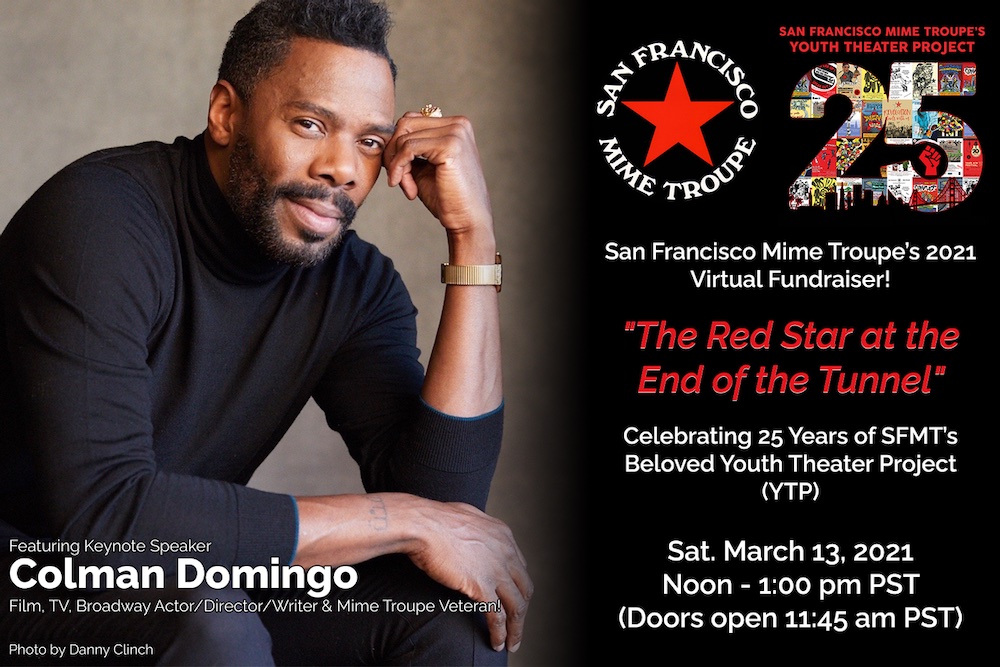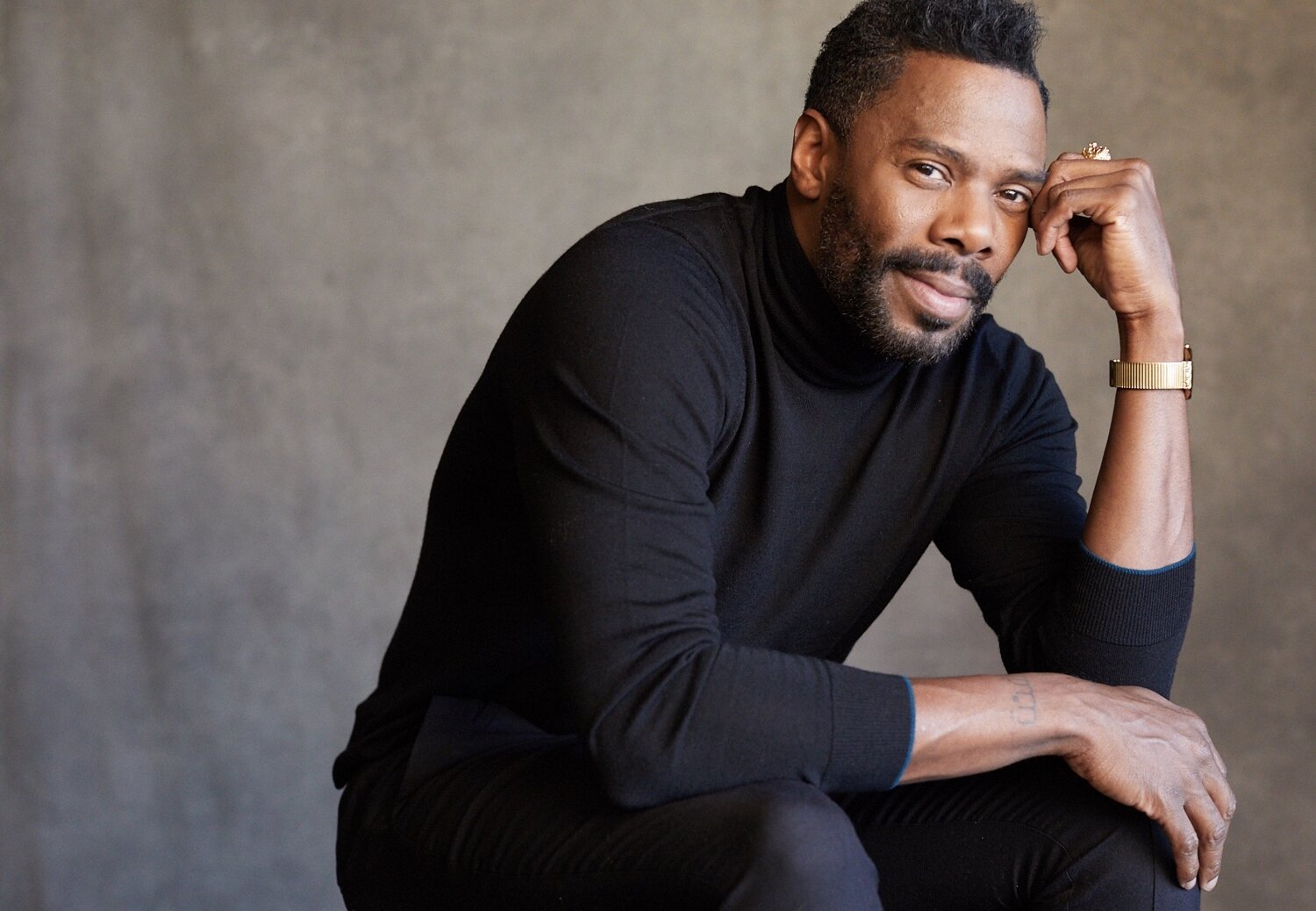Before he was a Broadway or Hollywood star, Colman Domingo was an aspiring actor, who, in the early ‘90s, moved to San Francisco from his native Philadelphia to hone his craft.
In describing his artistic journey, the multiple-award-winning stage, TV, and film actor, director, and writer—best known for his work on AMC’s Fear the Walking Dead, HBO’s Euphoria, and in the films If Beale Street Could Talk and Ma Rainey’s Black Bottom—falls back on a quote from Christopher Guest’s eccentric director character, Corky St. Clair, in Waiting for Guffman.
“I came ‘with a dance belt and a tube of chapstick’ and a dream,” says Domingo, with a laugh. “That’s what I did with San Francisco.”
Domingo has fond memories of the Bay Area. It’s where his stage career began in earnest in 1994. In his just over a decade there, he worked with such notable companies as Theatre Rhinoceros, Berkeley Rep, San José Rep Theatre, and American Conservatory Theatre.
He also found love here—at a Berkeley Walgreens, to be precise—as he recently told GQ Magazine.
Another highlight from the multi-hyphenate’s time in the Bay was working with the SF Mime Troupe (SFMT), back in 1998. Not on its stage, but behind-the-scenes as a teaching assistant and codirector of the show Cool Advice, performed by its Youth Theater Project (YTP), an afterschool program, which brings underserved middle and high school students together to tell their own stories.
“We were in the Outer Mission working with disenfranchised youth, black and brown kids mostly—and it was great,” says Domingo. “I love when I’m able to work with youth and really help give them a place and space where they can talk about what they are navigating in their lives. It’s about them knowing that their voice matters.”
He’ll speak further about his time with the YTP at SFMT’s hour-long 2021 virtual fundraiser: The Red Star at the End of the Tunnel (Sat/13 12pm). The event, marking 25 years of the children’s program, also promises music, reminiscences from Troupe members and alumni, and a live performance of the next installment of SFMT’s radio/podcast series, Tales of the Resistance. The fundraiser will be followed by the 2021 YTP Culminating Performance & 25th Anniversary Celebration (Sat/13 2pm).
I spoke to Colman Domingo about coming to San Francisco, finding his partner IRL, working opposite the late Chadwick Boseman, and why SFMT remains dear to him.

48 HILLS Of all the theatre capitals in all the world, you chose San Francisco. Why?
COLMAN DOMINGO I moved to the Bay Area to become an artist. I moved there because a couple of my good buddies moved to the Bay Area. We were just getting out of college, so I thought I’ll try that and see what that’s about. For 10 years, I was there and part of the theatre community. It was politically charged and people who cared about others and their place in the world—and I wanted to be a part of that. The San Francisco that I was a part of felt like the ‘60s, even though it was the ‘90s. It still had that feeling of possibility and making changes in the world, and mine was as an artist in the Bay Area.
48 HILLS Part of that work was also guest-starring on Nash Bridges, the San Francisco show, which seemingly featured every actor living in the Bay Area from ‘96 to 2001.
COLMAN DOMINGO Yeah, I did my share of Nash Bridges. My dear friends, Barbie Stein and Nina Henninger did the casting as well, so I was on it like four or five times as very different characters, more than likely some version of a criminal because those were the roles.
It’s like Law and Order for any actor in New York. It’s definitely a rite of passage.
48 HILLS And the work you did here eventually took you to Broadway.
COLMAN DOMINGO Yes, it did. By the time I left San Francisco, I was working at every major theatre. But I wanted to go to the places that scared me again, the places I was more unsure of, so I moved to New York. I knew I had a great foundation from the Bay Area, so I threw myself into the shark-infested waters of Broadway and Off-Broadway, and somehow I survived. So I know the Bay Area greatly influenced me to have a sense of self-worth as an artist. And that’s the only way I could survive in New York, to be honest, and in film and TV in LA.
48 HILLS As you told GQ in a recent interview, before leaving town, you met your future husband, Raul Aktanov in 2005 at a Berkeley Walgreens. You locked eyes, but Raul was pulled away by a friend. Then when searching for an iPod Touch on Craigslist, you came upon Raul’s Missed Connection to you, responded to it, and arranged your first date with him. You then told him that you loved him on that first night. I can’t imagine that most people today, who have their noses buried in their swiping apps, can even conceive of interacting with someone in such a fearless way.
COLMAN DOMINGO I think I grew up very analog in a way, and I love that part of myself. I grew up believing you would magically meet someone by locking eyes. I believe in love and magic and that it will come in the most unexpected places.
Then be open and brave enough to say “Hi” and let that not cost you anything. I think the idea that I told Raul I loved him on our first date when I thought he was sleeping…I don’t know if I’d say that was bravery. It just made sense to me because that’s the way I lived in the moment and trusted in my truth. I went with my heart and soul.
The reason we wanted to share this story after 16 years is that we wanted to put that bit of hope and faith out there for people, especially at this time, which is trying times for everyone, for them to believe that you can find love in the most unique and unexpected places. It’s not going to be on an app; that’s one thing I know for sure.
48 HILLS Everyone’s going to be rushing to their nearest Walgreens as soon as they read this, I’m sure.
COLMAN DOMINGO Hopefully, there’s someone meeting someone at a Walgreens right now. [Laughs]
48 HILLS I have to ask you about telling Raul you loved him on your first date. How could you know that you love someone that quickly?
COLMAN DOMINGO I just knew I loved him the moment I met him. If it’s honest and it’s real, you know it.
We didn’t play any games, where I’m going to wait a couple of days before I call him back. Nah, it was just, “I like you, let’s hang out, and let’s keep getting to know each other. Let it be that sincere.”
All that people want is honesty and sincerity. But we were also very realistic with each other. I made it clear to him that I didn’t want to meet his representative. “I want to see who you really are, not just that warm, fuzzy, romantic person.”
I would almost snap us out of the romance and say, “Let’s ask each other questions, so I know who you really are.” And I think we got to that level of truth, which is why it happened quickly. We met in March and became domestic partners in December of that same year. We were together for 10 years, then got married in New York in our living room, and now it’s been 16 years.
48 HILLS You recently sat across from Zendaya for the filming of December’s Euphoria special. You’ve said that the hard conversation that your character, Ali, has with Zendaya’s Rue, is very reflective of 2020. Tell me more about that.
COLMAN DOMINGO I think that’s what that episode was truly about. It’s about these two addicts on Christmas Eve and I love that it was very stripped down and bare. Rue was unpacking her disease, but it was also about who we are in the world, what we want, what is happening outside, and how we can be a part of it.
At the end of this year, when that premiered, we were all in the collective space to receive that message, which is why I thought it was one of the most impactful moments of TV this past year. It felt like a sermon talking about the themes of America we’ve been wrestling with for a year and why everything came to the surface because we were able to witness it together.
We’re all at home and there’s no other noise. We can really go to the root of problems, see it clearly, and see where we can get better. We can see our own sickness as a culture. So I think that’s what that episode was about and I know it’s truly one of the most significant pieces of TV I’ve been a part of.
48 HILLS What was your experience working opposite the late Chadwick Boseman in Ma Rainey’s Black Bottom?
COLMAN DOMINGO I loved working with Chad. He was inquisitive, fun, funny, and incredibly smart. The first thing he said when he saw me at rehearsal, was “Oh, I can’t wait to dance with you, Colman. I’ve been waiting to get in the ring with you.” We just did that and gave it everything we had.
Here was a dear human being, who was just awesome when it came to what he fought for and the way he talked about black people and culture. He was a bit of a philosopher, shaman, musician, and artist.
I think he lives the way I thought of him. I think he soars on a higher plane and he’s even bigger and can affect much more. I think we had him for the time we had him, and now that he’s gone, he lives on in people’s memory and also what he put out to the world—and it means a lot to be a part of that.
48 HILLS Why, after all these years, is it meaningful to you to continue to support SF Mime Troupe?
COLMAN DOMINGO The SF Mime Troupe is very important because of the messages it puts forth each year. It always wants you to think about your world, your place in it, and what’s going on around you politically. It’s really about wrestling with these messages together, these things we want and trying to make the world a better place. That’s why I think it’s been around for a long time.
While the main stage show is important, the work they do outside of it is really important as well. How they work with disenfranchised communities—that civic work is very important to them. So I think that’s why it’s long-lasting, appreciated, and respected.
The Red Star at the End of the Tunnel
Sat/13, 12pm, donations requested
Tickets and more info here.



